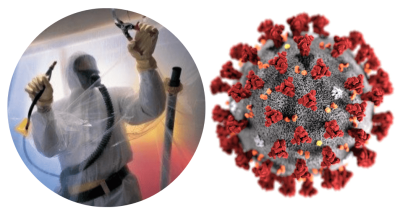
Asbestos abatement workers have been essential long before the COVID -19
pandemic hit. Since then and the subsequent lockdown, many cities have
been accelerating construction work due to the closures of many public
spaces, and property owners are taking advantage of the extra time at
home to perform renovations. While asbestos abatement jobs are in high
demand, the workers themselves have a much higher risk of severe complications
if they were to be diagnosed with COVID -19.
According to NIOSH, some of the riskiest industries for occupational health
in the United States are ones that involve exposure to asbestos. Even
low exposures to asbestos can cause severe health problems such as chronic
shortness of breath, pulmonary fibrosis, lung cancer, and mesothelioma,
a form of cancer caused
only by exposure to asbestos. Those already diagnosed with an asbestos related
disease or breathing problems are at the highest risk for developing severe
complications if contracting the virus.
Marcelo Crespo, an abatement worker in New York City, states that this
past April colleagues and friends were sharing news of other abatement
workers deaths from COVID -19 nearly every day.
Workers are supposed to wear masks but the more protective the mask, the
more difficult it can be to breathe. This can lead to cardio-respiratory
strain which causes the heart rate to increase which could lead to heart
attack. You may see workers wearing those little white medical masks,
which do absolutely nothing to protect from the inhalation of asbestos
fibers. Contractors and workers will at times overlook safety regulations
to get the job done faster.
Crespo hopes to one day find a new line of work and is taking evening classes.
He would like to help others find a way out of the business as well, but
with the high unemployment rate especially now it seems near impossible.
Many workers know the risks but continue to do the work for the guarantee
of a steady income.
Crespo says the threat of contracting coronavirus doesn’t scare him
that much, because he’s already used to worrying about his health
from asbestos exposure.
Read more
here.